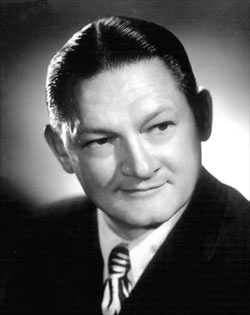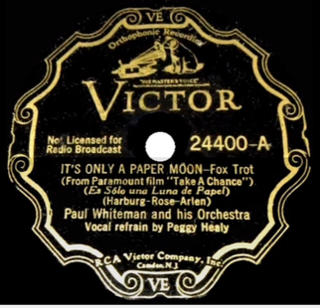
Albert Victor Young was an American composer, arranger, violinist and conductor. Young was posthumously awarded the Academy Award for Best Music Score of a Dramatic or Comedy Picture for Around the World in 80 Days at the 29th Academy Awards in 1957.

Nathaniel Shilkret was an American musician, composer, conductor and musical director.

"Singin' in the Rain" is a song with lyrics by Arthur Freed and music by Nacio Herb Brown. Doris Eaton Travis introduced the song on Broadway in The Hollywood Music Box Revue in 1929. It was then widely popularized by Cliff Edwards and the Brox Sisters in The Hollywood Revue of 1929. Many contemporary artists had hit records with "Singin' in the Rain" since its release, including Cliff Edwards, Earl Burtnett and Gus Arnheim in 1929 alone. It entered the American public domain on January 1, 2025.
"Walkin' My Baby Back Home" is a popular song written in 1930 by Roy Turk (lyrics) and Fred E. Ahlert (music).
"Temptation" is a popular song published in 1933, with music written by Nacio Herb Brown and lyrics by Arthur Freed.
"On the Street Where You Live" is a song with music by Frederick Loewe and lyrics by Alan Jay Lerner from the 1956 Broadway musical My Fair Lady. It is sung in the musical by the character Freddy Eynsford-Hill, who was portrayed by John Michael King in the original production. In the 1964 film version, it was sung by Bill Shirley, dubbing for actor Jeremy Brett.
"Three Little Words" is a popular song with music by Harry Ruby and lyrics by Bert Kalmar, published in 1930.
"I Whistle a Happy Tune" is a show tune from the 1951 Rodgers and Hammerstein musical, The King and I. It is sung by the Governess Anna Leonowens to her son Louis after the curtain rises on Act One of the musical, to persuade him not to be afraid as they arrive in Siam to serve the King.

"It Had to Be You" is a popular song composed by Isham Jones, with lyrics by Gus Kahn. It was published on May 9, 1924. by Jerome H. Remick & Co. of New York. The Isham Jones Orchestra recorded an instrumental version of it on April 24, 1924, at Brunswick Studios, 799 Seventh Avenue, New York City, and it was released in July.
"With a Song in My Heart" is a show tune from the 1929 Rodgers and Hart musical Spring Is Here.

"It's Only a Paper Moon" is a popular song published in 1933 with music by Harold Arlen and lyrics by Yip Harburg and Billy Rose.

"Somebody Loves Me" is a popular song, with music written by George Gershwin, and lyrics by Ballard MacDonald and Buddy DeSylva. The song was published in 1924 and featured in George White's Scandals of 1924.
"Getting to Know You" is a show tune from the 1951 Rodgers and Hammerstein musical The King and I. It was first sung by Gertrude Lawrence in the original Broadway production and later by Marni Nixon who dubbed for Deborah Kerr in the 1956 film adaptation. In the show, Anna, a British schoolteacher who has been hired as a governess, sings the song as she strikes up a warm and affectionate relationship with the children and the wives of the King of Siam.
"Don't Blame Me" is a popular song with music by Jimmy McHugh and lyrics by Dorothy Fields. The song was part of the 1932 show Clowns in Clover and was published in 1933. Popular versions that year were recorded by: Ethel Waters, Guy Lombardo, and Charles Agnew.
"I've Got a Crush on You" is a song composed by George Gershwin, with lyrics by Ira Gershwin. It is unique among Gershwin compositions in that it was used for two different Broadway productions: Treasure Girl (1928), when it was introduced by Clifton Webb and Mary Hay, and Strike Up the Band (1930), when it was sung by Doris Carson and Gordon Smith. It was later included in the tribute musical Nice Work If You Can Get It (2012), in which it was sung by Jennifer Laura Thompson. When covered by Frank Sinatra he was a part of Columbia Records.
"Orange Colored Sky" is a popular song written by Milton Delugg and Willie Stein and published in 1950. The first known recording was on July 11, 1950, on KING records catalog number 15061, with Janet Brace singing and Milton Delugg conducting the orchestra.
"Mona Lisa" is a popular song written by Ray Evans and Jay Livingston for the Paramount Pictures film Captain Carey, U.S.A. (1949), in which it was performed by Sergio de Karlo and a recurrent accordion motif. The title and lyrics refer to the renaissance portrait Mona Lisa painted by Leonardo da Vinci. The song won the Academy Award for Best Original Song in 1950.

"Mississippi Mud" is a 1927 song written by Harry Barris, first sung by Bing Crosby as a member of Paul Whiteman's Rhythm Boys. Its musical composition entered the public domain on January 1, 2023.
"Stella by Starlight" is a popular jazz standard with music by Victor Young that was drawn from thematic material composed for the main title and soundtrack of the 1944 Paramount Pictures film The Uninvited. Appearing in the film's underscore as well as in source music as an instrumental theme song without lyrics, it was turned over to Ned Washington, who wrote the lyrics for it in 1946.
"The Lonesome Road" is a 1927 song with music by Nathaniel Shilkret and lyrics by Gene Austin, alternately titled "Lonesome Road", "Look Down that Lonesome Road" and "Lonesome Road Blues." It was written in the style of an African American folk song.







